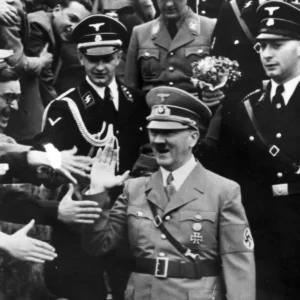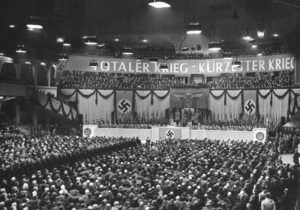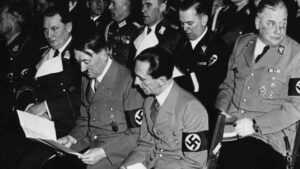On 13th January 1943, Adolf Hitler declared “Total War” against the Allies. But what is total war?
It means that the contenders are ready to make any sacrifice — life or resources — to win the war. But the German Army officially took the stance a little later, after Joseph Goebbels’ Sportpalast speech on 18th February.
But why did Hitler declare a total war?
Hitler had acceded to achieve because of the rapid deterioration of the German military position in the war in the East against the Soviet Union; he had finally been convinced that only a total war effort could counter what Hitler felt was the constant undermining of his military strategies by his generals.

Goebbels had been pushing for a total war effort for some time. He was convinced that everyone, from the Nazi elite to Germany’s privileged classes, must be prepared to sacrifice for the war effort and was supportive of measures that restricted hunting, the prohibition of the use of alcohol at Nazi functions, and the scarcity measures of one-course meals that Hitler had in mind.[1]
As early as 4th January 1943, he told his ministerial conference that
“we are confronted in the east with a brutal opponent who can only be defeated by the most brutal methods. To achieve this, the total commitment of all our resources and reserves is necessary,”
and he attempted to get Hitler to agree to a complete mobilization of the civilian population, for instance using women for work, and closing shops and cafes he considered to be luxuries.
Hitler agreed, but little progress was made to put these measures into effect, besides the appointment of a “Committee of Three” to oversee the total war effort, which included Martin Bormann, the head of the Nazi Party Chancellery and Hitler’s personal secretary, Hans Lammers, the head of the Reich Chancellery, and Wehrmacht General Wilhelm Keitel.
The National Broadcast
As Propaganda Minister, Goebbels understood that pressure could be brought to bear to push these initiatives along by way of a major propaganda campaign. On 18th February 1943, he made a nationally broadcast speech from the Berlin Sportpalast before a hand-picked audience of 14,000 Nazi members, in which he extolled the necessity of a Spartan way of life to achieve total war. During his speech he expressed his thoughts on German life and how it reflected the importance of a large propaganda campaign.
“Are you and the German people determined, if the Leader orders it, to work ten, twelve, and, if necessary, fourteen and sixteen hours a day and to give your utmost for victory? [Loud shouts of ‘Yes!’ and lengthy applause] … I ask you: Do you want total war? [Loud cries of ‘Yes!’ Loud applause] Do you want it, if necessary, more total, and more radical than we can even imagine it today? [Loud cries of ‘Yes!’ Applause”[2]

Hitler, who had given his general approval of Goebbels’ plan previously, had not known the specifics of what was going to be proposed, but when he read the text of the speech, he fell in behind the plan. However, within the Nazi Party, the speech was seen as a power move by Goebbels and Armaments Minister Albert Speer to displace the Committee of Three, which had accomplished little. Hitler, in his usual manner, preferred to keep his underlings in competition with other, and would not give either Goebbels and Speer or the committee the full authority necessary to achieve the goals that Goebbels saw as necessary, although by Autumn 1943, the Committee of Three—which had concentrated on trivial issues and got caught up in the bureaucratic nightmare of trying to eliminate overlap between the German government and the Nazi Party had effectively ceased to be a factor.
Pressure at the Top
Goebbels continued to pressure Hitler to commit more fully to the total war concept. He met with Hitler on 21st June for three hours, having used Hitler’s Wehrmacht adjutant, General Schmundt, to lay the groundwork. Before speaking to Hitler, Goebbels met with Speer, who advised him on the severe problem with the supply of fuel caused by American attacks on fuel plants. He also learned that, due to failures of the Luftwaffe to protect German cities from Allied air attacks, Hermann Göring had fallen out of Hitler’s favour. This was important to Goebbels, as Göring was a potential rival for control of any total war effort.

Ultimately, Goebbels did achieve some of his goals in the short-term, his own efforts were vain, this is outlined by many historians, but Richard J. Evans emphasises his argument that Germany’s economic resources were never adequate to turn German fantasies of imperial domination of Europe into reality. Not even when the resources of a large part of the rest of Europe were added to them. No amount of “mobilization for total war”, no degree of economic rationalization, could alter this fundamental fact of life.[3]
[1] Manvell, Roger & Fraenkel, Heinrich (2010). Goebbels: His Life and Death. New York: Skyhorse Publishing
[2] Evans, Richard (2008). The Third Reich at War. New York: Penguin
[3] Evans, Richard J, p760

